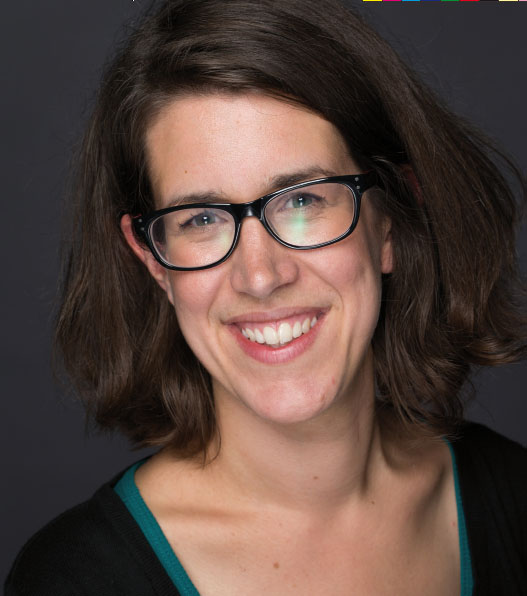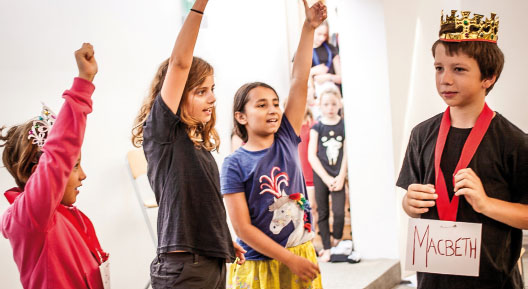
Despite being ‘slightly put off’ a job in the theatre after a two-week work experience placement at Creation Theatre Company during her time at the University of Warwick, Lucy Askew is now the CEO of the company.
‘I went away and for six years I did a sensible job and I worked in education,’ she tells me. ‘Then eventually, when I had my first child, I thought maybe I was a bit hasty to write off theatre. Very stupidly I thought that if I went into theatre it would give me a better work-life balance – the most naïve thing I've ever done.’
Askew began in Creation's Education department, working her way through most roles in the company, before taking the reins as chief executive in 2013. Since joining in 2008, she has worked hard to grow the theatre company's educational output, which has resulted in a third of Creation's income now coming from education activities.
Having just come from another Zoom call with Creation's new REP Company, Askew explains to me now: ‘We don't get any core funding at all, so we're entirely supported by ticket sales, education work and a little bit of fundraising. So [education] is a really substantial part of what we do and a really significant thing that's enabled us to survive over the last 23 years, but also be agile and independent.’

Lucy Askey, CEO
Home Delivery
When the pandemic hit, Creation Theatre did just that, partly out of financial necessity, and partly out of a desire to keep children engaged in storytelling through this turbulent time. Askew and her team quickly created Home Delivery, which began as a digital version of the weekly Drama Club for 5- to 19-year-olds but has ‘now become this whole other product of its own – it's more like an interactive TV show’.
Currently housed on Zoom, Home Delivery sessions use new technology and are tailored for the new digital stage (recently funded by Innovate UK) to fully immerse children and young people in classic stories. Askew explains, ‘We use virtual backgrounds and different software so we can put the children into stories. So, if we're doing Romeo and Juliet, one of them is actually seen on the balcony and one of them is below reading out the lines because we're able to take their webcam feed and put them into that environment.’
When children sign up, they receive a pack in the post each week, themed around a different story. ‘When we did Alice in Wonderland, they had a boardgame to play. With some of them we did 1984 one week and they got a Ministry of Truth lanyard with a QR code on it – when you scanned it you went to a website and on there you had Ministry of Truth propaganda.’
‘Sometimes it's really immersing them in the world of the story, and then other times it's more of a craft activity that relates to it. When we do Peter Pan, they get a shadow puppet that they make and then they do a whole movement sequence in Zoom, moving their puppet around and using the screen as a performance space.’
School of Creativity
As well as Creation's weekly Drama Club, Askew and the team also wanted to find a way of moving their holiday workshops online, where children would usually spend a week in a physical school doing drama and putting on a performance.
She said: ‘The School of Creativity moved online by becoming a website of a beautiful school – it looks a bit like a Wes Anderson Grand Budapest Hotel kind of thing. It's a cut-through school and the children get a password to log in for the week that they're coming, and then they can explore the school.’
The participating children click on each ‘room’ to experience different activities. Actors create ‘mad professor’ characters in some rooms, while others contain video content or PDFs on how to make something. Then, one of the links takes the child through to a live Zoom call, where they have their lesson. ‘You have a time that you have to have gone to the “theatre” by, for your Zoom lesson, but the rest of the time you can just explore the website.’ The next day when the students log in, the whole school has been updated and there's new content to explore.
‘It's just evolved into this completely new thing. If we opened up again tomorrow, I think we would do some lessons in halls like we used to, but we would still run this alongside it.’

© ALL IMAGES COURTESY CREATION THEATRE COMPANY
Children enjoying Creation's education work pre-Covid
Widening access
Askew continues: ‘Beyond the pandemic, there's a huge opportunity with this as a new medium that we can use to connect with children and schools. I think there's so much that can be done and so much that's really accessible. There's a lot of work to be done on the digital deficit and how we make sure children have the right equipment and the right access. Hopefully, we will find in the future that schools and families are better equipped to engage with this kind of content.’
Accessibility to digital theatre is not, however, solely about having a computer or fast broadband, which Askew acknowledges when she says: ‘If we knew that there was a family who wanted to do a show and they didn't have a computer, we'd just drive one over – we'd do everything we can to help with that. But it's difficult for people to know what you're doing, actually. If you don't have the equipment or if you're not in the brain space in which coming to see a show is even on your radar.’
Equipping the next generation
We also speak about the skills instilled through Creation's educational output, which, Askew explains, go beyond ‘Here's how to project your voice’ or ‘Here's how to act’. ‘I t is about being creative and thinking creatively. I think those are the skills that a new generation is going to need more than ever, because they're going into a world that is going to be very different.
‘The world is going to evolve and change rapidly, and climate change is going to change things a lot – so that spirit of curiosity and creativity is one of the most important things we can instil in children.’
Speaking of climate change, Askew tells me that the sustainability impacts of digital rather than in-person drama clubs is another reason why Creation is likely to continue online post-Covid. ‘There's a 99 per cent reduction in carbon because families aren't travelling. They weren't travelling long distances – most were just coming across Oxford – but once you remove that and you're only powering your computer for an hour, it's a big reduction.
‘I think we all have to be prepared for the fact that the old ways have to be radically rethought because we have to make change and we have to make change fast.’
The only constant
The feedback the theatre has received from families who have taken part has been ‘amazing’ and ‘really quite emotional’. Askew says, ‘Where everything else is constantly changing and being cancelled, we've just stayed absolutely constant and the children know that at this time they dial in and see the teachers they see every week and the class they've got used to, and they get this escape.’
As well as escapism, Askew adds: ‘My personal agenda is always wanting children to realise how many jobs there are in the theatre and that they're not all acting. We try and run sessions sometimes where we look at other aspects and try to get children away from the idea that the only thing you can do in theatre is act. We do a lot of work on trying to broaden that out and get them to appreciate the whole industry.’
If you need any more convincing of this CEO's commitment to the name of her theatre company, and to education, Askew and the team were also developing a storytelling escape room for schools just before lockdown in March. ‘We were working on going into schools – we'd have burner phones and NFC cards, and the phones play videos and sound, and the teachers have been taken over by aliens. The children have to problem-solve and melt ice cubes with keys inside.’
‘At some point, we'll be working on that with teachers to make a digital version where we deliver a set to the school and the children do it. Obviously not any time soon because they're all at home. Unless we can make a version that the children do at home – maybe that's the next step.’
